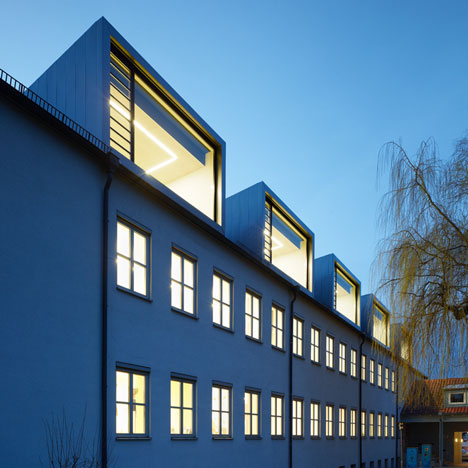German studio Archifaktur has inserted felt-lined caves and green-floored playrooms into the loft of a 1930s primary school (photographs by Zooey Braun).
Five new attic rooms at the Alte Schule Winterbach provide childcare facilities both inside and outside of teaching hours.
Teachers use one of the green rubber-floored rooms as an office, whilst the other four accommodate activities that include cooking, crafts, music and games.
Behind the playrooms are recessed "caves" - felt-lined compartments that children can hide in.
A series of removable screens allow flexible levels of privacy between the rooms and the 50 metre-long corridor that connects them.
Two other schools recently featured on Dezeen also integrate folding screens and panels - see also a Japanese school with integrated furniture and an Italian kindergarten with removable wall blocks.
More information is provided by Archifaktur:
Kernzeitbetreuung Alte Schule Winterbach
Terms and definitions: ,Alte Schule Winterbach‘ is the name of the building and means Old School Winterbach. ,Kernzeitbetreuung‘ is childcare during the daytime (from 7 am to 4 pm).
Through the transformation of society and its forms arise new demands on classrooms and their peripheral areas.
The model of integrated childcare in primary school aged from 6 to 10 years called for new space. To counteract the unrestrained use of land and to preserve the centrality of the primary function an extension of the childcare was provided in the untapped attic of the school building from 1935.
Dropped boxes should implement the necessary space, light and an extraordinary atmosphere.
The new structures are following the typical of that period stringent grid facade in a 3-1-3-rhythm.
Five cubes brace themselves out on the eastern side of the 50-meter- long roof - self confident and at the same time with respect to the inventory.
The goal was to leave the western view of the building as an identification attribute in original appearance. The spatial concept of different height zones in the cross-section and a meandering layout that allows a flexible division of space into zones of different sizes.
The central corridor develops all the zones in the north-south direction, gives children space to run and it is -cause of a sloped ceiling reflector- a link to the different elevation zones in east-west axis.
The cubes are divided into a teacher's room and four modules - each module with a little cave: the multifunction module with a variety of games, the art module for painting and handicrafts, the supply module for cooking and baking, the multimedia module for music and dance.
In the south towards the emergency exit there is another multifunctional space, changing rooms and sanitary units to the north. In the caves, lined with soft felt, children can retire while other children participate exciting activities.
The coloring of the interior was limited to a few sensitive coordinated colors and materials: natural white color for built-in furniture, walls and ceilings, happy green rubber floor, dark gray wool felt and natural oak wood.
The integrated sanitary zone rises optically out of the floor and is kept consequent in happygreen. This is to bring foothold, harmony and wellbeing to the offspring. Staged openings allow fantastic views to the village with the church from 1309 and to the valley slopes in the distance.
Location: 73650 Winterbach, Germany
Construction phase: March 2010 - March 2011

